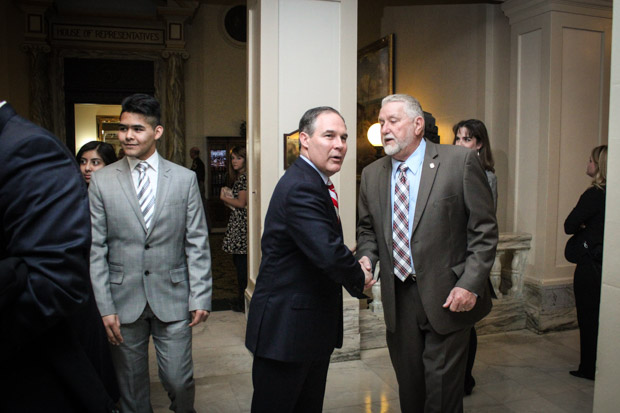
Emails Show EPA Boss Pruitt Worked In Concert With Industry He Now Regulates
-
Joe Wertz

Joe Wertz / StateImpact Oklahoma
Scott Pruitt shakes hands at the Oklahoma Capitol.
Emails made public Wednesday show newly confirmed U.S. Environmental Protection Agency Administrator Scott Pruitt coordinated with the fossil fuel industry and political groups to fight federal environmental regulations when he served as Oklahoma’s attorney general.
The emails show oil and gas companies and electric utilities sent Pruitt talking points and drafts of letters opposing federal regulations on ozone, fracking and emissions from oil and gas wells — regulations the newly confirmed EPA boss now oversees. In some cases, Oklahoma’s then-attorney general adopted the industry’s arguments directly.
A judge on Feb. 16 ordered the attorney general’s office to release the emails in response to a lawsuit by the Center for Media and Democracy, a left-leaning nonprofit watchdog group that requested the documents two years ago under Oklahoma’s Open Records Act.
The release contains about 7,500 pages of emails, none of which suggest any illegal activity. The emails do show industry and political interest groups enjoyed a close, comfortable and collaborative relationship with Pruitt’s attorney general’s office.
The AG’s office did not release emails it believes are exempted from public release. District Judge Aletia Haynes Timmons is reviewing those claims, and has ordered the agency to produce other emails requested by the watchdog group.
The emails show:
- Industry group American Fuel & Petrochemical Manufacturers in July 2013 asked Pruitt’s office to write an Oklahoma petition opposing biofuel quotas in the Renewable Fuel Standard.
- The president and CEO of Oklahoma electric utility Public Service Co. personally thanked Pruitt in February 2014 after the EPA withdrew its proposal for a rule written to limit haze from coal-fired power plants thought to be limiting visibility at national parks.
- Regular communications between state agency staff, free-market and pro-industry groups and think-tanks, including the Oklahoma Council of Public Affairs; the American Legislative Exchange Council, or ALEC, whose conference Pruitt spoke at in May 2013; and Americans for Prosperity, the nonprofit advocacy group backed by billionaire brothers Charles G. and David H. Koch, whose executive thanked Pruitt in August 2013 for pushing back against regulations by the EPA “and its axis with liberal environmental groups.”
Pruitt and the EPA did not respond to requests for comment. In a statement, the Oklahoma AG’s office said the records lawsuit was politically motivated. In previous interviews, testimony before Congress and other public remarks, Pruitt has made it clear he thinks industry should have a prominent seat at the table when governments write regulations and rules.
“I believe that we as an agency and we as a nation can be both pro-energy and jobs and pro-environment,” he said in his first address to employees at the EPA.
Some of the emails released include ones requested by the New York Times for a 2014 investigation. Pruitt sent one letter to the EPA that was written almost entirely by Devon Energy, in which he accuses the agency of overestimating the amount of air pollution from oil and gas wells in Oklahoma.
The emails further detail Pruitt’s close relationship with the fossil fuel industry, a key reason environmental groups and Democrats vehemently opposed President Trump’s pick to be the nation’s No. 1 environmental watchdog.
Republicans defeated procedural boycotts by Democrats and ignored requests to delay Pruitt’s confirmation vote until the emails were released, praising the then-Oklahoma attorney general as a much-needed reformer eager to roll back job-killing and ineffective environmental regulations.
The Center for Media and Democracy’s Research Director Nick Surgey says the emails give the public a guide for scrutinizing Pruitt’s involvement in environmental regulations going forward.
“There will be some serious questions asked about whether Pruitt should recuse himself from certain decisions he would make as head of the EPA,” he says.
